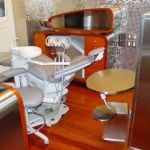- Introduction: What Happens When a Tooth Gets Knocked Out?
- Immediate Action: How to Handle a Knocked-Out Tooth
- Tooth Preservation: How to Save Your Knocked-Out Tooth
- When to See a Dentist: Urgency in Treating a Knocked-Out Tooth
- Long-Term Care: What Happens After the Tooth is Replanted
- Prevention: How to Avoid Future Tooth Injuries
- Conclusion: Quick Action for the Best Outcome
Introduction: What Happens When a Tooth Gets Knocked Out?
When a tooth is knocked out, whether through an accident, sports injury, or another trauma, it can be both painful and alarming. However, how you respond to this emergency can greatly influence whether or not the tooth can be saved. Prompt action is critical, and knowing what to do in this situation can make the difference between saving your tooth or needing a dental implant.
In this article, we will walk you through the essential steps for handling a knocked-out tooth, what to do immediately after the injury, how to preserve the tooth for reimplantation, and when to seek professional help. Whether the tooth is permanent or a baby tooth, timely care is vital for the best possible outcome.
Immediate Action: How to Handle a Knocked-Out Tooth
When a tooth is knocked out, acting quickly is essential to prevent permanent damage. Follow these steps immediately:
- Remain calm: It’s important to stay calm to make rational decisions. Assess the situation and focus on what you can do right away.
- Find the tooth: If the tooth is still intact, carefully pick it up by the crown (the part that is usually visible above the gum) and avoid touching the root. The root is delicate and can be damaged easily.
- Rinse the tooth gently: If the tooth is dirty, rinse it gently with clean water. Do not scrub it or use soap or other chemicals as this can damage the tooth. Avoid drying it out.
- Try to reinsert the tooth: If possible, try to place the tooth back into its socket. Gently bite down on a clean cloth to hold the tooth in place. This is the best way to preserve the tooth's viability.
- If you can't reinsert the tooth, keep it moist: If reinsertion is not possible, place the tooth in a container with milk, a saline solution, or your own saliva. Keeping it moist is crucial for the tooth's survival. If no other options are available, you can wrap it in a clean cloth or paper towel.
Time is of the essence when it comes to saving a knocked-out tooth. The sooner you can get to a dentist, the higher the chances of successful reimplantation.
Tooth Preservation: How to Save Your Knocked-Out Tooth
When you find yourself in this situation, the goal is to preserve the knocked-out tooth until you can get professional dental care. As mentioned, the best option is to place the tooth back into its socket, but if that’s not possible, there are several methods of preserving the tooth’s viability:
- Milk: Milk is one of the best ways to keep a knocked-out tooth viable. Its natural pH helps maintain the cells on the root of the tooth, making it more likely to be successfully reimplanted later.
- Saline Solution: If milk is unavailable, a saline solution (similar to salt water) can help keep the tooth moist and preserve its cells.
- Your Own Saliva: If no other options are available, place the tooth in your mouth between your cheek and gums. The natural moisture of your mouth can help preserve the tooth until you can seek dental care.
- Tooth Preservation Kits: Some dental supply companies offer tooth preservation kits that can be purchased and kept on hand for emergencies. These kits contain a solution designed specifically to preserve the tooth until a dentist can replant it.
Once the tooth is properly preserved, the next step is to get to a dentist as quickly as possible. A dentist will evaluate the tooth and determine whether it can be successfully replanted.
When to See a Dentist: Urgency in Treating a Knocked-Out Tooth
After a tooth has been knocked out, time is crucial. You should see a dentist as soon as possible, ideally within 30 minutes to an hour. The longer you wait, the less likely it is that the tooth will be able to be successfully reimplanted. Even if it's been several hours, it’s still worth seeking dental care.
A dentist will assess the tooth and the socket to determine the best course of action. If the tooth can be reimplanted, the dentist will use a splint or other dental devices to secure the tooth in place while it heals. If the tooth cannot be reimplanted, the dentist will discuss alternative options, such as dental implants or bridges.
In some cases, if the tooth has been out for too long, the dentist may not be able to save it. However, even in these situations, the dentist will work with you to find a suitable replacement option for your smile.
Long-Term Care: What Happens After the Tooth is Replanted
If your tooth is successfully replanted, it’s important to follow your dentist’s instructions carefully to ensure it heals properly. Typically, the dentist will advise you to eat soft foods, avoid using the tooth for chewing, and possibly wear a splint for a few weeks while the tooth reattaches to the gum and bone.
During this recovery period, it’s essential to attend follow-up appointments with your dentist. They will monitor the healing process and ensure that there are no signs of infection or other complications. It’s also important to maintain excellent oral hygiene to avoid infection and promote healing.
In some cases, even after replantation, the tooth may not fully heal or may become loose over time. If this occurs, your dentist may recommend further treatments or replacements, such as a dental implant.
Prevention: How to Avoid Future Tooth Injuries
While accidents happen, there are steps you can take to reduce the likelihood of a tooth injury in the future. Here are some tips:
- Wear a Mouthguard: If you play contact sports or engage in activities where you might fall, wearing a mouthguard can protect your teeth from injury.
- Be Cautious of Accidents: Always be aware of your surroundings, especially in situations where a fall or trauma is possible. This can help you avoid sudden impacts to your mouth.
- Regular Dental Check-ups: Regular dental visits can help ensure that your teeth are healthy and can withstand impacts. Dentists can also detect issues like tooth grinding that may make your teeth more susceptible to injury.
Conclusion: Quick Action for the Best Outcome
When a tooth is knocked out, the steps you take in the first few minutes are critical. By acting quickly, keeping the tooth moist, and seeking dental care right away, you increase the chances of saving the tooth. Even if replantation isn't possible, there are alternative solutions that can restore your smile.
Remember, accidents happen, and while you can’t always prevent a knocked-out tooth, being prepared and knowing what to do can make all the difference. If you find yourself in this situation, don't hesitate to contact your dentist or visit Dentistry Toothtruth for advice on dental care and products to support your recovery and long-term oral health.







 The Orthodontic Studio5.0 (72 review)
The Orthodontic Studio5.0 (72 review) Lane & Associates Family Dentistry - Raleigh Wake Forest Road4.0 (1405 review)
Lane & Associates Family Dentistry - Raleigh Wake Forest Road4.0 (1405 review) Sweet Tooth Dental5.0 (314 review)
Sweet Tooth Dental5.0 (314 review) Blue Whale Children's Dentistry of Hawaii4.0 (21 review)
Blue Whale Children's Dentistry of Hawaii4.0 (21 review) Schnierow Dental Care3.0 (177 review)
Schnierow Dental Care3.0 (177 review) Dr. Jeffrey R. Shapiro - iSmile5.0 (324 review)
Dr. Jeffrey R. Shapiro - iSmile5.0 (324 review) The Importance of Oral Health Education During Pregnancy for a Healthy Pregnancy
The Importance of Oral Health Education During Pregnancy for a Healthy Pregnancy Best Tips for Brushing Your Teeth Properly for Healthy Gums: Essential Techniques for Oral Health
Best Tips for Brushing Your Teeth Properly for Healthy Gums: Essential Techniques for Oral Health Why Skipping Dental Checkups Can Lead to Bigger Oral Health Problems
Why Skipping Dental Checkups Can Lead to Bigger Oral Health Problems Advantages of Porcelain Dental Restorations
Advantages of Porcelain Dental Restorations How Can Diabetes Cause Tooth and Gum Problems? Preventing and Managing Oral Health Issues
How Can Diabetes Cause Tooth and Gum Problems? Preventing and Managing Oral Health Issues Healthy Habits for Promoting Good Oral Health and Hygiene: Tips for a Healthy Smile
Healthy Habits for Promoting Good Oral Health and Hygiene: Tips for a Healthy Smile